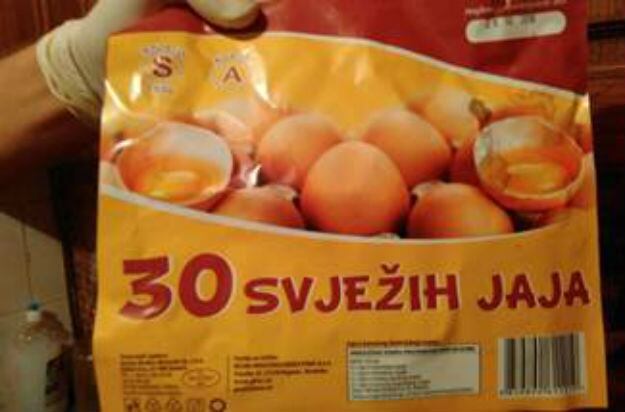The Netherlands said it had found S. enteritidis in chicken eggs from a farm in Poland via the RASSF portal last week. Eggs were delivered to some restaurants and have been processed into different dishes.
Investigations are ongoing to see how many cases are linked to the eggs and if other sources of contamination are possible.
Outbreak cases have been reported by Belgium, Denmark, Luxembourg, the Netherlands, Norway, Sweden and the UK. Nine confirmed cases are associated with travel history to Hungary or Poland.
Country investigations
L’Agence Fédérale pour la Sécurité de la Chaîne Alimentaire (AFSCA) in Belgium said eggs were delivered by various Dutch suppliers to hundreds of restaurants but retail businesses were not known to be affected.
Eggs with code "3PL30221 ***" (*** can match any digit) stamped on them are affected.
Folkhälsomyndigheten (Public Health Agency of Sweden) told us it had 14 cases, of which five belonged to outbreak WGS-cluster 175 and three to outbreak WGS-cluster 360.
The first case was reported in April and the latest illness onset date was beginning of September.
However, the suspected eggs from Poland have not been imported to Sweden, according to Livsmedelsverket (National Food Agency).
The agencies added they are investigating the link to see if cases had eaten raw egg products.
Fødevarestyrelsen (The Danish Veterinary and Food Administration) said it is investigating an outbreak of four cases of S. enteritidis that cluster with reported outbreaks in other EU countries.
The investigation is by the Central Outbreak Coordination Group consisting of the Statens Serum Institut (human epidemiology), DTU National Food Institute (zoonoses laboratory) and the DVFA.
“The DVFA central outbreak investigation unit are currently trying to find the food source of the Danish outbreak. The DVFA are working on different leads including trace-backwards and trace-forwards of suspected food items. At this stage it is too early to comment on the leads," Nikolas Kühn Hove, head of alert unit for Food and Feed at the DVFA, told FoodQualityNews.
“We can confirm that there has been an import of eggs from the same egg packing centre in Poland, suspected of exporting eggs infected with Salmonella. We cannot confirm if these eggs are contaminated or not.
“So far we have documentation that eggs imported to Denmark from the Polish packing centre in question have been processed and heat treated.”
Ingrid Heglebäck, advisor in the regulatory department, hygiene and drinking water section at Mattilsynet (Norwegian Food Safety Authority), said it has two positive S. enteritidis samples from routine sampling in May and November 2015 by a Norwegian company who imported the eggs from Poland.
“The Norwegian company does not sell the eggs directly to the consumer, but uses them in different egg products. These egg products are heat treated before they go on the market, in other words the products are no threat to the human health.
“These two positive Salmonella Enteritidis samples match the cluster that is responsible for the human outbreaks in other European countries.”
Polish response and Croatian investigation
Polish authorities said the producer of eggs contaminated by Salmonella is from the Wielkopolska province.
Główny Inspektorat Weterynarii (the chief veterinary inspectorate) said it has prohibited marketing of eggs from the site except those intended to have heat treatment.
The agency added it has also taken swabs from areas including the surface of production facilities to see if they are positive.

Croatia is also investigating a foodborne outbreak suspected to be caused by eggs from Poland.
Authorities said eggs were manufactured by Fermy Drobiu Woźniak (Woźniak Poultry Farms) and put on the Croatian market by Mesna industrija braće Pivac d.o.o.
FQN has contacted Fermy Drobiu Woźniak but is yet to hear back.
Minister Tomislav Tolušić said because of doubt in the safety of the eggs from packing center “PL 30225901 WE” they were withdrawn from the market.
Mesna industrija braće Pivac d.o.o. said despite some negative sample results product has been withdrawn.
Public Health England has been working with colleagues in Scotland, Wales, the Food Standards Agency and the European Centre for Disease Control on the investigation of a multi-country outbreak of Salmonella Enteritidis
Dr Lesley Larkin, head of Salmonella Surveillance at Public Health England, said although the risk remains very low it is important to wash your hands properly and ensure food is thoroughly cooked.
"There are two distinct but genetically related strains of S. Enteritidis that have been reported to have caused illness such as diarrhoea and vomiting in 144 cases in the UK since 2014. There have also been cases reported from other European countries including the Netherlands, Belgium, Sweden and Norway.
"We are working closely with public health officials to ensure the situation is fully monitored and appropriate risk mitigation action is taken based on the findings of the investigations to date."
ECDC and EFSA assessment
A multi-country outbreak of S. Enteritidis phage type (PT) 8 with multiple locus variable-number tandem repeat analysis (MLVA) profiles 2-9-7-3-2 and 2-9-6-3-2 is being investigated, according to the European Centre for Disease Prevention and Control (ECDC).
Based on whole genome sequencing (WGS), isolates are part of two distinct but related genetic clusters.
ECDC is preparing a rapid outbreak assessment with EFSA to be published later this week.
In August, the Netherlands reported an increase in cases of S. Enteritidis with the same MLVA profile.
This re-started an investigation after the outbreak was considered over following illnesses reported in the first few months of this year.
In January, the UK (Scotland) noted an increase in cases and three additional countries reported illnesses but a common source or vehicle was not identified.
Cases belonging to the genetic clusters were identified since February 2012 however a large increase has been recorded since July 2015, said ECDC.
